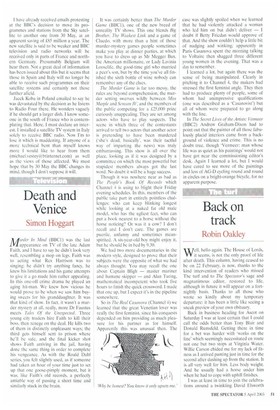Death and
Venice
Simon Hoggart
Mirder In Mind (BBC1) was the last appearance on TV of the late Adam Faith, and I have to say he didn't look very well, resembling a mop on legs. Faith was to acting what Rex Harrison was to singing; he didn't try anything fancy, he knew his limitations and his game attempts to give it a go made him rather appealing. In this one-off crime drama he played an aging hit-man. We knew how vicious he would prove to be when we saw him buying sweets for his granddaughter. It was that kind of show. In fact, it wasn't a murder mystery at all, really, more Dr Faustus meets Tales Of the Unexpected. Three young city traders hire Faith to kill their boss, then renege on the deal. He kills two of them in distinctly unpleasant ways; the third gets himself sent to prison where he'll be safe, and the final kicker shot shows Faith arriving in the jail, having done the same thing in order to complete his vengeance. As with the Roald Dahl series, you felt slightly used, as if someone had taken an hour of your time just to set up that one goose-pimply moment, but it was, like Faith's old records, a perfectly amiable way of passing a short time and similarly stuck in the brain.
It was certainly better than The Murder Game (BBCI), one of the new breed of unreality TV shows, This one blends Big Brother, The Weakest Link and a game of Cluedo, with more than a hint of those murder-mystery games people sometimes make you play at dinner parties, at which you have to dress up as Mr Megger Bux, the American millionaire, or Lady Lavinia Looselife, the good-time girl who married a peer's son, but by the time you've all finished the sixth bottle of wine nobody can remember any of the clues.
The Murder Game is far too messy, the rules are beyond comprehension, the murder setting swerves wildly between Miss Mople. and Scream IV, and the members of the public competing for a £25,000 prize curiously unappealing. They are set among actors who have to play suspects. The scene in which three of the contestants arrived to tell two actors that another actor is pretending to have been murdered (she's dead, basically', was their tactful way of imparting the news) was truly embarrassing. This show is all over the place, looking as if it was designed by a committee on which the most powerful but stupidest members always got the last word. No doubt it will be a huge success.
Though it was nowhere near as bad as The People's Book Of Records which Channel 4 is using to blight their Friday evening schedules. In this, members of the public take part in entirely pointless challenges: who can keep blinking longest while looking at a naked fat old male model, who has the ugliest feet, who can put a book nearest to a horse without the horse noticing? Or was it a cow? I don't recall and I don't care. The games are puerile, unfunny and sometimes meanspirited. A six-year-old boy might enjoy it, but he should be in bed by 9.30.
We had two more documentaries in the modern style, designed to prove that their subjects were the opposite of what we had always thought. You may recall the one about Captain Bligh — master mariner and humane skipper — and Alan Turing, mathematical incompetent who took five hours to finish the quick crossword. I made that one up, but I expect it's in the pipeline somewhere.
So in The Real Casanova (Channel 4) we learned that the great Venetian lover was really the first feminist, since his conquests depended on him providing as much pleasure for his partner as for himself. Apparently this was unusual then. The case was slightly spoiled when we learned that he had violently attacked a woman who led him on but didn't deliver — I doubt if Betty Friedan would approve of that. And the show couldn't help a little bit of nudging and winking; apparently in Paris Casanova spent the morning talking to Voltaire then shagged three different young women in the evening. •That was a day to remember.
I learned a lot, but again there was the sense of being manipulated. Clearly in pitching it to Channel 4, the makers had stressed the first feminist angle. They then had to produce plenty of people, some of whom had unimpressive qualifications (one was described as a `Casanovist') but all of whom were prepared to go along with the line.
In The Secret Lives of the Artists: Vermeer (BBC2) Andrew Graham-Dixon had to point out that the painter of all those fabulously placid interiors came from a background of violence and crime. This is no doubt true, though 'Vermeer: man whose life was as quiet as his paintings' would not have got near the commissioning editor's desk. Again I learned a lot, but I would have cared to see more of the paintings and less of AG-D cycling round and round in circles on a bright-orange bicycle, for no apparent purpose.


































































 Previous page
Previous page